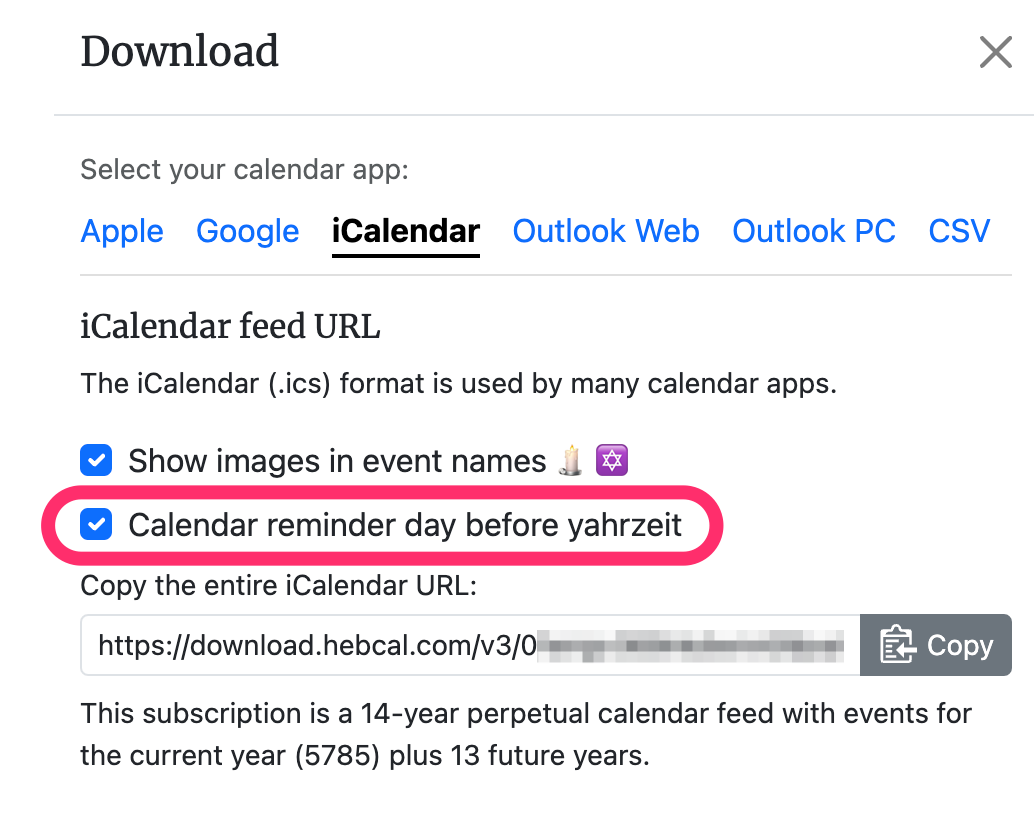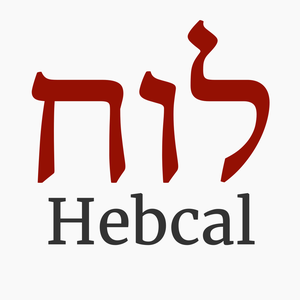Your comments
Hebcal.com supports over 100,000 different GeoName IDs. These are world cities with a population of 1,000 or more.
See cities1000.zip from https://download.geonames.org/export/dump/
If you download cities1000.zip it should match what we have on Hebcal.com
Draft version on Hebcal website.
For some reason the Sefaria source you pointed us to skips Yoreh De'ah simanim 1-62 and 64-83.4:
8/4/2032,Arukh_HaShulchan%2C_Orach_Chaim.696.12-697.2
8/5/2032,Arukh_HaShulchan%2C_Yoreh_De'ah.63.1-8
8/6/2032,Arukh_HaShulchan%2C_Yoreh_De'ah.63.9-17
8/7/2032,Arukh_HaShulchan%2C_Yoreh_De'ah.83.5-9
8/8/2032,Arukh_HaShulchan%2C_Yoreh_De'ah.83.10-19
Thanks for using the Hebcal Yahrzeit + Anniversary calendar, and thanks for your feedback.
The "duplicate" events you are seeing are the optional calendar reminders the day before each yahrzeit. This is not a bug, nor are they duplicate events. They are an optional reminder with an alarm to help users light candles the evening the Yahrzeit begins.
If you don't want these day-before reminders, please simply uncheck the "Calendar reminder day before yahrzeit" box before downloading or subscribing to the calendar feed.

Thank you! That would be great. The Sefaria transliteration for Tur Names would be best as that would help us with hyperlinking.
You can email to mradwin@hebcal.com
Thank you! Yes indeed - this might help. This will be especially useful if the calendar has a clear cycle that can be implemented in a perpetual way.
When we last checked several years ago, Sefaria learning calendars were programmed by Gregorian date and therefore not necessarily easy to discern the perpetual cycle rules from a simple CSV file covering a year or two or three.
By the way, we can get your app to work just fine if you make the following changes:
index 64e508a..db6d809 100644
--- a/package.json
+++ b/package.json
@@ -8,7 +8,8 @@
"@capacitor/device": "^5.0.0",
"@capacitor/ios": "^5.0.0",
"@capacitor/network": "^5.0.0",
- "@hebcal/core": "^5.3.3",
+ "@hebcal/core": "^5.8.6",
+ "@hebcal/locales": "^6.0.1",
"@ionic-native/core": "^5.36.0",
"@ionic-native/geolocation": "^5.36.0",
"@ionic/react": "^5.5.0",
diff --git a/src/components/Cal.jsx b/src/components/Cal.jsx
index 0529921..09204b7 100644
--- a/src/components/Cal.jsx
+++ b/src/components/Cal.jsx
@@ -4,7 +4,7 @@ import React, { useEffect, useState, useLayoutEffect } from 'react'
import { IonText, IonIcon, IonButton, IonPopover, useIonViewWillEnter, IonPage, IonContent } from '@ionic/react';
import { chevronBackOutline, chevronForwardOutline } from "ionicons/icons"
import { HebrewCalendar, Location, GeoLocation, Zmanim, HDate } from '@hebcal/core';
-// import '@hebcal/locales';
+import '@hebcal/locales';
import axios from 'axios'
import add from 'date-fns/add'
import sub from 'date-fns/sub'
Customer support service by UserEcho


When you customize your calendar, enter "0" (zero) in the Havdalah minutes past sundown box to disable Havdalah times.
https://www.hebcal.com/hebcal